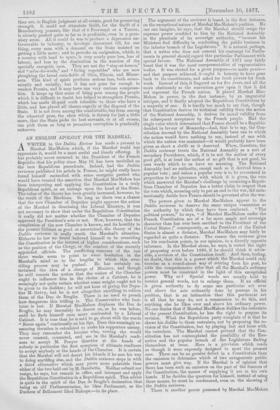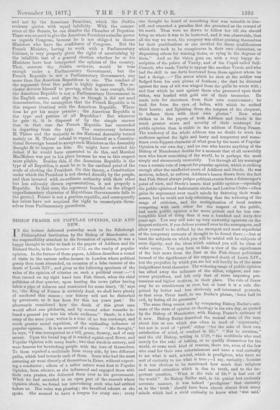AN ENGLISH APOLOGY FOR THE MARSHAL.
AWRITER in the Dublin Review has made a present to Marshal MacMahon which, if the Marshal could but appreciate it, would be a most useful and timely offering. It has probably never occurred to the President of the French Republic that his policy since May 16 has been modelled on the best Republican precedents. Indeed, had the Dublin reviewer published his article in France, he might easily have found himself embroiled with some energetic prefect who would have treated the assertion that Marshal MacMahon has been interpreting and applying the Constitution in a truly Republican spirit, as an outrage upon the head of the State. The value of the theory has been greatly increased, however, by the result of the Elections. So long as there was a chance that the new Chamber of Deputies might approve the action of the Marshal in dismissing the Liberal Ministry, it was not necessary to show that under the Republican Constitution it really did not matter whether the Chamber of Deputies approved the President's acts or not. Now, however, that the complexion of the new Chamber is known, and its hostility to the present Cabinet as good as ascertained, the theory of the Dublin reviewer is really worth the Marshal's attention. Hitherto he has no doubt believed himself to be overriding the Constitution in the interest of higher considerations, such as the position of the Clergy, or the comfort of the recently appointed officials. The conflicting rumours of the last three weeks seem to point to some hesitation in the Marshal's mind as to the lengths to which this over- riding process may be pushed. He has certainly en- tertained the idea of a change of Ministry, and though he still resents the notion that the wishes of the Chamber ought to influence him in the choice of a Cabinet, he is seemingly not quite certain whether some weight ought not to be given to its dislikes ; he will not hear of giving the Depu- ties M. Grevy, but he is not altogether unwilling to relieve them of the Due de Broglie. There is no need to preach how dangerous this trifling is, The Conservative who hesi- tates is lost. If Marshal MacMahon displaces the Due de Broglie, he may insensibly be drawn on, as he was before, until he finds himself once more confronted by a Liberal Cabinet. It is true that he is said to go about with the words 4' Never again " continually on his lips. Even this seemingly re- assuring iteration is calculated to make his supporters uneasy. They may remember the heroine who, vowing she would never consent, consented, and see in the Marshal's readi- ness to accept M. Pouyer Quertier at the hands of nobody in particular the first symptom of ultimate readiness to accept anybody at the hands of the Chamber. It is certain that the Marshal will not desert his friends if he sees his way to doing anything else, and the Dublin reviewer steps in with a third alternative which may prove more palatable than either of the two held out by M. Gambetta. Neither submit nor resign, he says, but remain in office, and interpret and apply the Republican Constitution in a Republican spirit. This advice is quite in the spirit of the Duo de Broglie's declaration that being an old Parliamentarian, he likes Parliament, as the Duchess of Bellamont liked Bishops,—in its place. .The argument of the reviewer is based, in the first instance, on the exceptional nature of Marshal MacMahon's position. No one can imagine, he says, that the Marshal should resign the supreme power confided to him by the National Assembly in the plenitude of its sovereign authority, " because his Ministers find difficulty in conducting the public business in the inferior branch of the Legislature." It is natural, perhaps, that a writer who does not conceal his contempt for Parlia- ments in general should regard this particular Parliament with special favour. The National Assembly of 1871 may fairly boast that it was the most unrepresentative of representative bodies. It was elected for a given purpose—to make peace— and that purpose achieved, it ought in honesty to have gone back to its constituents, and asked for fresh powers for fresh work. Instead of this, it lingered on for five years, and all the more obstinately as the conviction grew upon it that it did not represent the French nation. It placed Marshal Mac- Mahon in power, in the first instance, by an ungrateful intrigue, and it finally adopted the Republican Constitution by a majority of one. It is hardly too much to say that, though that Constitution derives its technical validity from the action of the National Assembly, it derives its moral validity from its subsequent acceptance by the French people. Had the single voice which determined that France should be a Republic decided in favour of Monarchy—had, that is to say, the Con- stitution decreed by the National Assembly been one to which the nation would have nothing to say, instead of one with which the nation was contented—it would probably have been given as short a shrift as it deserved. When, therefore, the Dublin reviewer treats the National Assembly as a sort of secondary Providence, which, if it be not the author of every good gift, is at least the author of no gift that is not good, he uses words which to us have no meaning. The National Assembly had no authority, except such as it derived from a popular vote ; and unless a popular vote is to be reverenced in proportion to the ignorance with which it is given, the vote which answered the Marshal's challenge by returning a Repub- lican Chamber of Deputies has a better claim to respect than the vote which, meaning only to put an end to the war, did unin- tentionally decide how France should be governed after the war.
The powers given to Marshal MacMahon appear to the Dublin reviewer to deserve the same unique veneration as the authority by which they have been conferred. "The political powers," he says, « of Marshal MacMahon under the French Constitution are of a far more ample and sovereign character than has ever been ascribed to the President of the United States ;" consequently, as the President of the United States is almost a dictator, Marshal MacMahon may fairly be regarded as quite a dictator. The reason the reviewer gives for his conclusion points, in our opinion, to a directly opposite inference. In the Marshal alone, he says, is vested the right of proposing even before 1880, if he should think it advis- able, a revision of the Constitution itself. And then, feeling, no doubt, that this is a power which the Marshal could only exercise as a round-about way of retiring from his post, he adds the comprehensive rider that all the Marshal's ordinary powers must be construed in the light of this exceptional power. Why so I Special words are usually held to restrict general words, not to enlarge them. If an official is given authority to do some one particular act over and above the acts ordinarily done by persons in his position, that is an intimation that this particular act is all that he may do, not a commission to do this, and anything else he likes over and above his ordinary power. No one denies that if Marshal MacMahon dislikes the restraints of the present Constitution, he has the right to propose its revision. What the Republican party complain of is that he shows his dislike to these restraints, not by proposing the re- vision of the Constitution, but by playing fast and loose with the restraints. The Marshal cannot pretend that the Con- stitution has not contemplated the possibility of the Exe- cutive and the popular branch of the Legislature finding themselves at issue. Here is a provision which reads as though it were expressly designed to meet the present case. There can be no greater defect in a Constitution than the omission to determine which of two antagonistic public powers must give way. If the Marshal is of opinion that there has been such an omission on the part of the framers of the Constitution, the means of supplying it are in his own hands. If he decides the question for himself, instead of using these means, he must be condemned, even on the showing of the Dublin reviewer.
There is another power possessed by Marshal MacMahon
and not by the American President, which the Dublin reviewer quotes with equal infelicity. With the concur- rence of the Senate, he can dissolve the Chamber of Deputies. There was no need to give the American President a similar power as regards Congress, because he is not oblige d to choose Ministers who have the confidence of Congress, But the French Ministry, having to work with a Parliamentary Cabinet, is very properly given the right of ascertaining by the infallible test of a general election whether he or his Ministers have best interpreted the opinion of the country. That, answers the Dublin reviewer, would be true enough under a Parliamentary Government, but the French Republic is not a Parliamentary Government, any more than the American Republican is one. The conduct of the argument from this point is highly ingenious. The re- viewer devotes himself to proving, what is easy enough, that the American Republic is not a Parliamentary Government in the English sense, and slips in, as though it did not need demonstration, the assumption that the French Republic is in this respect identical with the American Republic. Where does he get his major premiss ; the American Republic is the type and pattern of all Republics ? But wherever he gets it, it is disposed of by the simple answer that in that case the French Republic has succeeded in departing from the type. The controversy between M. Thiers and the majority in the National Assembly turned mainly on M. Thiers' refusal to regard himself as a Constitu- tional Sovereign bound to accept such Ministers as the Assembly thought fit to impose on him. He might have avoided his defeat if he would have consented to do this, and Marshal MacMahon was put in his place because he was in this respect more pliable. Besides this, if the American Republic is the type of all Republics, it must be so in the cardinal point of the mode of electing the President. On this theory, a Constitution under which the President is not elected directly by the people, and thus invested with co-ordinate authority with their other but less solemnly chosen representatives, is not properly a Republic. In that case, the argument founded on the alleged unparliamentary character of Republican Governments falls to the ground. France is not a genuine republic, and consequently her rulers have not acquired the right to emancipate them- selves from Parliamentary precedents.







































 Previous page
Previous page